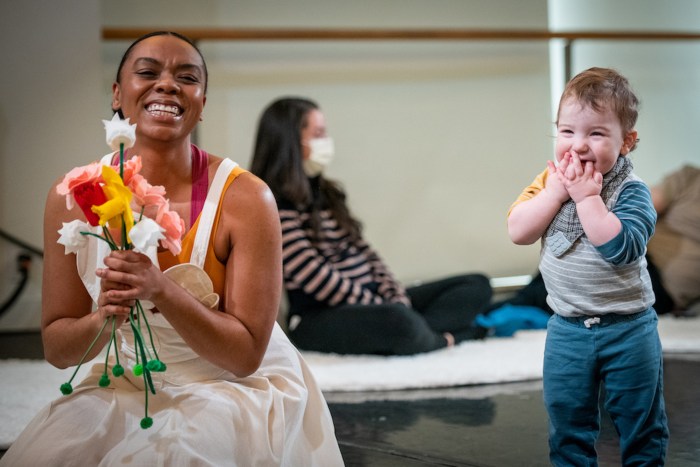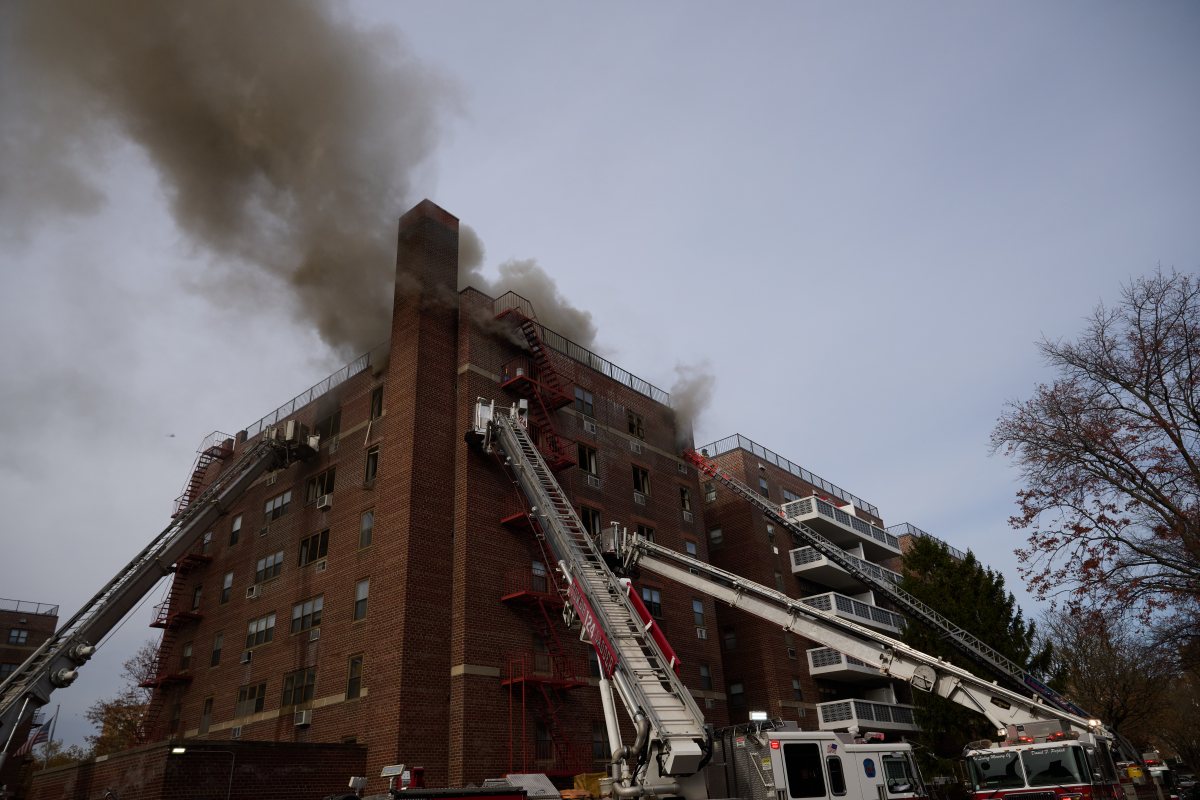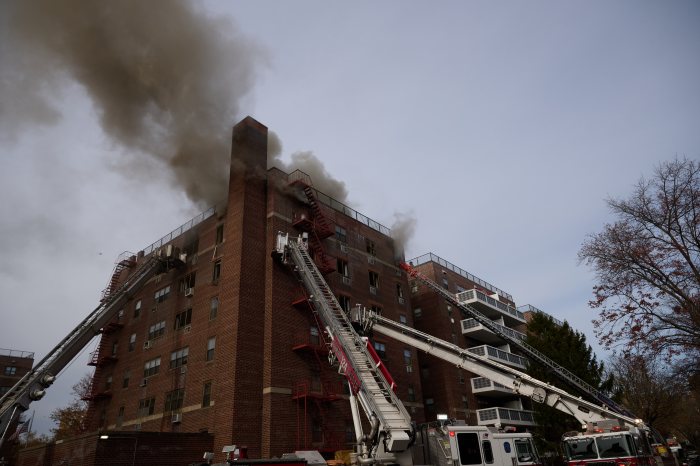BY MARTIN DENTON (of nytheatre.com)
Duo spearheading dual projects
Adventurous theatergoers will have two opportunities to sample the work of The Nerve Tank in the next few weeks. Their show “Opal” began a two-week run on April 28. It’s being presented by Incubator Arts Project (the outgrowth of Richard Foreman’s Ontological Hysteric Theater’s lab/developmental arm, which is as natural a place to find this innovative “post-dramatic” troupe as any). And right after “Opal” closes, “The Attendants,” an “interactive performance exhibit,” will have a three-day run (May 12 -14), presented by Arts World Financial Center.
These shows on the surface appear to have little in common. Except — and this is the main point — a questing and playful understanding of what “theatre” can be nowadays, coupled with a strong sense of intellectual curiosity. This juxtaposition is indeed the hallmark of The Nerve Tank’s work.
Founded about five years ago by real-life husband and wife Chance D. Muehleck (a writer) and Melanie S. Armer (a director), The Nerve Tank makes theatre around themes that intrigue them, applying techniques and concepts that they’ve learned and adapted over years of serious work in the indie theatre community. I sat down with Chance and Melanie to talk about their work and its evolution, and here’s some of what they had to tell me:
DENTON: How did you two first meet? And how did you figure out that you would be professional collaborators?
ARMER: I met Chance the first day he came to NYC and crashed on my boyfriend’s couch! The boyfriend used to have these amazing salons at his apartment which we all called “The Tiny Happy” (it’s New York after all — it was tiny, but we were happy!). We’d drink a lot of whiskey and whoever was around would read each other’s work. I loved Chance’s writing and we became friends and real fans and supporters of each other. We were both members of Circle Rep at the time, so fast forward a few years to when Circle produced a short play marathon, it seemed pretty obvious for me to direct his. We kept working together and developed a very close artistic relationship.
We kind of fell into forming a theatre company when Circle closed its doors because we wanted to see work fully produced for an audience and not just “read” to death. The Nerve Tank’s post-dramatic style came out of our shared desire to see the things we were both only seeing in our heads. It just wasn’t happening on stages yet. I think a lot of the trust we’ve built in The Nerve Tank and our collaborative style comes directly from this long-standing personal and artistic relationship.
MUEHLECK: I guess that’s all true. It’s difficult to recall some of it. Whiskey was definitely drunk. And yes, I started imagining different kinds of performance texts at around the time Melanie was looking to expand her style. So we keep growing together.
DENTON: Where did you get your theatre training?
MUEHLECK: My best training has been outside the classroom, which is probably true for most artists. At Hampshire College I was able to combine different areas of study and that kind of promiscuity led to some interesting choices. My performing background is useful now as a guide for the blueprints I make for our theatrical assemblies. Also, I’m not sure I see any real distinction between acting for the stage and behaving in life. It’s all just making choices in time and space. But that’s a different topic.
ARMER: My parents were really curious theatregoers, so I grew up seeing a lot of pretty incredible theatre including Joanne Akalaitis’s incredibly controversial “Endgame,” the original “Oleanna” at the Back Bay Theater Company, lots of Robert Wilson at A.R.T and a healthy dose of the classics produced at BU’s professional program. I worked with Shakespeare and Company while still in high school and started directing then. I came back to NYC after college specifically to work at Circle Rep and found myself surrounded by real-world teachers including Lanford Wilson, Joe Mantello and Michael Warren Powell. I eventually got a Broadway assisting job with Len Foglia. Now I take all kinds of classes that interest me. I have studied Butoh, Viewpoints, Lecoq-based Poetic Precision, Post-dramatic theater and lots of dance and other kinds of devising. I have to give a shout out to the Lincoln Center Theater Directors Lab here too, because a lot of the work I do now came from the work and the people I was exposed to there.
DENTON: How do you work with collaborators to develop pieces like “Opal” and “The Attendants”?
ARMER: We always start with the text or treatment. Chance and I work on that for a while, then bring in the design team, then the performers. I cast from our company, often by asking them how they see themselves in the show. We start by reading through the text and discussing the basic ideas with everyone involved in the project. Designers’ voices are as strong as the performers, Chance’s and mine. We talk about how we can best share the ideas we’ve gathered from the text physically. I firmly believe that once a group of artists agrees on the vision we are after, all the ideas lead in that direction. Those that don’t just kind of drop away. I’m always the outside eye when we are working, and it’s my job to keep the project moving towards the ideas we all agreed on. What’s most fun about working with this company is that we really challenge each other. The performers and designers are the first to tell me when I am getting precious about something!
MUEHLECK: The only thing I’d add is that I’m maybe a bit less democratic about what I want to see. I like pure form, and if I’ve conceived something and we’re dedicating resources to it, I’ll be very specific about certain things. But this is why you must choose good people to work with. By good, I mean they share an aesthetic or they’re willing to poke around in it with you. It also means that they have creative ideas of their own. As Melanie suggested, some of the most amazing moments in our work have been initiated by our collaborators. Which is fortunate because I’m lazy.
ARMER: Right. Lazy. Me, too. That’s why we get along and surround ourselves with all these super smart peeps!
MUEHLECK: She is so not lazy. Her work ethic would put a 17th-century Puritan to shame.
As someone who has seen these artists’ work — with The Nerve Tank and elsewhere — please take it from me that any laziness, if it even exists, never shows up in their finished products. Their work is always accomplished, richly detailed, and reflective of their intelligence and long experience in theatre. “Opal” and “The Attendants” may not be like each other — or like much that we typically see in the world of NYC theatre — but they are almost certain to be worth your time, if you’re a seeker of challenging and stimulating work.
The Nerve Tank’s website is www.nervetank.com.




































